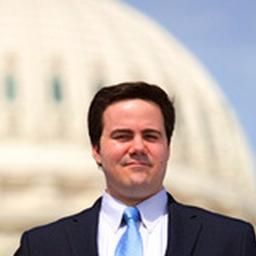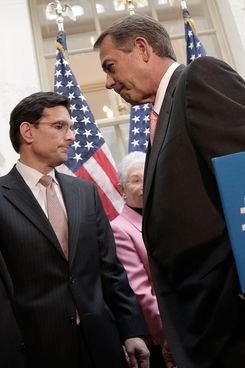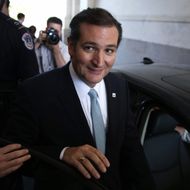
As the dust settles from the government shutdown and debt-ceiling standoff, and while John Boehner and Ted Cruz figure out what’s next from out the wreckage, at least one man on the right is giddy. “I feel like I’ve been up for three straight weeks,” says Robert Costa, the National Review’s Washington editor and star blogger, who has been in the thick of it all as the government edges up to economic destruction. He’s not even tired. “I don’t feel like I need to exhale,” he says, the end finally in sight. “Whenever things get hot, that’s when I love it.”
He has reason to: Costa has been celebrated by his colleagues and subjects alike as a must-read this month, his reporting from behind the closed doors of Republicans in Congress held up as indispensable, a shining beacon of the form in which a man tirelessly asks questions and prints the answers without fluff or bluster. He’s been called “the most important reporter in the country,” “omnipresent,” and “the only winner here.” (Costa and his team got so many scoops about the GOP’s constantly changing strategy that congressional leadership warned members about leaking to the National Review, a fact also reported by the National Review.) Since Monday, he’s gained more than 7,000 Twitter followers, and seemingly tweeted as many times.
But he shrugs it all off. “It’s just been more of the same,” Costa says (although he did make sure to e-mail this writer a story called “Robert Costa’s Moment”). “Report, report, report. That’s all I do.”
He’s been at it for a while, if only held up as a national star for a few days. In high school, Costa wrote music and concert reviews for his local paper, the Bucks County Courier Times in Pennsylvania, but he was in a story before he really started writing them. Along with his classmates, “Bob” — he uses “Robert” as a byline to avoid confusion with Bob Costas — was featured in Wonderland: A Year in the Life of an American High School, a book by Michael Bamberger.
Active in student government and interested in politics, Costa was painted as an overachieving people-pleaser, but not quite a sycophantic Eddie Haskell type. “His father, a lawyer, had a business card, the junior-class president saw how useful it was, so he ordered some for himself,” Bamberger writes. “His card read: Bob Costa, Pennsbury High School.”
“If you have that level of earnestness, you’re never going to be one of the cool kids,” Bamberger recalls now that his subject is all grown-up. (They’re still in frequent touch.) “Being eager is the worst thing you can possibly be.” But Costa was not “Über-in-your-face” about it, Bamberger says. “Most people have this instinct to try so hard to impress the other person, but he doesn’t. You can have that at an obnoxious level — he doesn’t cross the line.”

It’s served Costa well with members of Congress, whose trust he’s gained by working hard and shooting straight. “What I try to do is understand the language of conservatism,” he says. “A tea party rally has political meaning and depth to it beyond being a spectacle. Once in a while, of course, it has its circus-like moments, but it is a serious strain of America, of the political conversation.”
His ability to take all sides seriously may have earned him as many ins as having the National Review on his business card. “Most Capitol Hill reporters don’t understand the conservative mind-set or why someone would be a Republican,” says Tim Carney, senior political columnist at the Washington Examiner. “This gave Bob a huge leg up. Simultaneously, most conservatives don’t engage in shoe-leather reporting. This gives him a second leg up. Two legs up!”
From high school, where Costa is remembered for leading a successful campaign to get a pre-fame John Mayer to perform at prom — Costa “knew the lyrics of songs Mayer had not even recorded yet,” writes Bamberger — he attended Notre Dame, where he ran the TV station and wrote for the school paper. He interned for George Stephanopoulos and Charlie Rose, landed a fellowship at The Wall Street Journal’s editorial page, and got a master’s in politics from Cambridge in less than a year. (He wrote his thesis on Churchill.)
All the while, his politics were still developing. “I was a Bob Casey Democrat in high school — pro-life, went to public school, and listened to jam bands,” he says. “But I was 18-years-old when I graduated.” That year, he stumbled into a job as a strategist on the special election campaign of Republican Mike Fitzpatrick, who won a seat in the House, and “it was only after then that I even knew what the National Review was.”
In 2009, Costa was named the first-ever William F. Buckley fellow after the magazine founder’s death, but with the support of editor Rich Lowry pursued reporting instead of the polemical style of a movement publication. “From Day One, I’ve never written a column or an editorial. In four-plus years,” he says. At 23, “I was not comfortable even aspiring to be Buckley or George Will, but I felt comfortable aspiring to be a solid reporter.”
Now 28, that view separates Costa from most of his contemporaries, who grew up broadcasting their opinions online and feeling important for it. “There’s something old-fashioned about Bob,” says Bamberger. “Even though he’s plugged in to social media and popular music. He’s much more like those old-timers on the Sunday morning talking shows in Brooks Brothers and a striped tie. He has a middle-aged-man take on all of life.”
“I’m just not very comfortable always sharing my views and making an argument. I’ve never been that kind of guy,” says Costa. “I have my own views, but every day I try to wipe the board clean. Basically, I’m a middle-of-the-road guy who’s mostly conservative, who loves to report.”
His preference to lay out what lawmakers say, sans much analysis, has earned Costa some criticism from tea partiers who think he’s a shill for the Establishment, while others to the left have seen him as making excuses for the Ted Cruzes of the world. “His thing is not passing judgment one way or the other,” says Philip Klein, a conservative writer at the Examiner. “People know they can talk to him.”

“There aren’t actually that many people who take the time to understand who these guys are and what their motivations are as individuals,” says Slate political reporter Dave Weigel, another colleague without a bad word to say about Costa. (Others describe him as “amiable, “keen,” and “generous.”) “There are [reporters] who pop up when there’s a problem,” says Weigel. “He tries to understand them at all times.”
The tack is rare outside of the mainstream media, especially at conservative outlets, where “for most people, media is columns and editorials,” says Costa, “and it has been the core for decades.” Instead of simply pandering with a “team mentality,” Costa has used the doors his platform opens and added the basics of reporting as a novel concept, which has only begot more access.
“My political hero is Robert Caro, not any politician,” says Costa. “With his Johnson books he chronicled power. I try to get beyond the glib quote and get inside the cloak room to find out who’s using power and why. That’s not a partisan pursuit.”





























